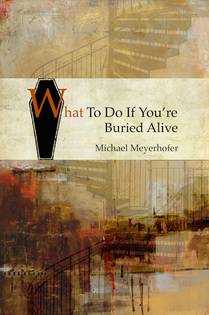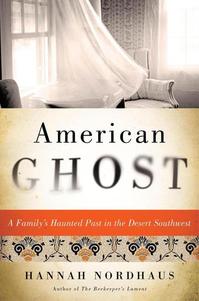
Michael Meyerhofer's newest collection of poetry, What To Do If You're Buried Alive explores the way that the past shapes who we become. Constructing poems from both personal narratives and lyrical observations, Meyerhofer not only ventures into the realm of memory to capture those times that teach us that surviving can turn into hope, he also finds poetic moments in everyday life.
What To Do If You're Buried Alive is divided into two sections, with the first part titled "Scars". In this part, the reader finds the narrator exploring the way scars, both emotional and physical, teach us about surviving tragedy. Many of the poems in this section revolve around the death of the narrator's mother. For instance, in "My Mother's Darkness," the persona muses,"I wonder sometimes if she saw it coming ." A few lines later, we learn that the narrator's mother once interrupted a routine walk in the park because she felt "there was something bad in the trees." The next day, a girl's body is found, the event perhaps foreshadowing the mother's own death. In another poem, the speaker, after his mother's death, confronts an alcoholic grandfather learning that "the heart/like a dog betrays us but we/when we must, call this forgiveness."
Meyerhofer intertwines poems about these emotional losses with poems that confront loss through physical scars. Through many of the poems we learn that the narrator was born with a physical ailment, described in "How It Started" as a "kinked spine" that left the narrator in pain "no pill could cure." This ailment, not understood by his parents or the narrator himself, is dismissed by his world: "In Iowa/what you can't fix, you ignore./This explains my parents." Still, in later lines, the reader learns the narrator's own lessons about physical health explaining, that when one focuses on what is causing the pain, "it dissolves//like a light from a burnt-out bulb/a curtain gone up in flames."
While the first half of the book dives into memory, the second section, titled "Tattoos" takes a look at more present moments in the narrator's life. For example, in "Conjugal Visits" the narrator finds himself thinking about the innmates at the Delaware County jail, "who just so happens to reside/across the street from our kitchen." In another poem, "Tattoo Parlor," the narrator thinks about the tattoos he never paid for, "the kind even therapy and cocaine can't erase." There are some poems that do return to the themes of loss found in the first section of this book, but often the lines are more humorous. In the lighthearted, "My Mother Sent Me" the speaker explains that his mother always sends text messages from her coffin with messages saying "Glad you're not here." While the mother later explains that her communications suggest that "it's to help me/savor my remaining/days," the narrator believes it's only because he is the only one left who "hasn't changed/his number."
Interesting scars make interesting stories, a friend of mine once told me. Indeed, after reading the poems located in both sections of this collection, the same can also be said for tattoos. Other readers may insert that both scars and tattoos offer stories of survival and hope, and yes, surrounding the poet's struggle with the pain of physical health and the loss of a mother, we see a cast of characters who are also finding hope in their stories. In these poems, we listen to Iowa wrestlers who are trying to "knuckle their way out" of their current surroundings. We see elderly women, "whose eyes go damp/for no reason" sitting in the audience of a poetry reading. We hear two children in first grade talk on the phone, just enough to say "hi and bye" but learning what the adults have forgotten, that it's enough "to hear breath/which those big textbooks tell us/help fuel our blood, the only real thing/that ever comes from the heart."
I have enjoyed the work of Michael Meyerhofer since I picked up his book, Leaving Iowa many years ago. Indeed, one of his other collections, Blue Collar Eulogies, remains one of my favorite contemporary poetry books of all time. What To Do If You're Buried Alive is definitely a great addition to his poetic work.
For more information on this book, see Michael Meyerhofer's home page, where readers can find work and reviews about his poetry as well as his new adventures in the fantasy writing world.
What To Do If You're Buried Alive is divided into two sections, with the first part titled "Scars". In this part, the reader finds the narrator exploring the way scars, both emotional and physical, teach us about surviving tragedy. Many of the poems in this section revolve around the death of the narrator's mother. For instance, in "My Mother's Darkness," the persona muses,"I wonder sometimes if she saw it coming ." A few lines later, we learn that the narrator's mother once interrupted a routine walk in the park because she felt "there was something bad in the trees." The next day, a girl's body is found, the event perhaps foreshadowing the mother's own death. In another poem, the speaker, after his mother's death, confronts an alcoholic grandfather learning that "the heart/like a dog betrays us but we/when we must, call this forgiveness."
Meyerhofer intertwines poems about these emotional losses with poems that confront loss through physical scars. Through many of the poems we learn that the narrator was born with a physical ailment, described in "How It Started" as a "kinked spine" that left the narrator in pain "no pill could cure." This ailment, not understood by his parents or the narrator himself, is dismissed by his world: "In Iowa/what you can't fix, you ignore./This explains my parents." Still, in later lines, the reader learns the narrator's own lessons about physical health explaining, that when one focuses on what is causing the pain, "it dissolves//like a light from a burnt-out bulb/a curtain gone up in flames."
While the first half of the book dives into memory, the second section, titled "Tattoos" takes a look at more present moments in the narrator's life. For example, in "Conjugal Visits" the narrator finds himself thinking about the innmates at the Delaware County jail, "who just so happens to reside/across the street from our kitchen." In another poem, "Tattoo Parlor," the narrator thinks about the tattoos he never paid for, "the kind even therapy and cocaine can't erase." There are some poems that do return to the themes of loss found in the first section of this book, but often the lines are more humorous. In the lighthearted, "My Mother Sent Me" the speaker explains that his mother always sends text messages from her coffin with messages saying "Glad you're not here." While the mother later explains that her communications suggest that "it's to help me/savor my remaining/days," the narrator believes it's only because he is the only one left who "hasn't changed/his number."
Interesting scars make interesting stories, a friend of mine once told me. Indeed, after reading the poems located in both sections of this collection, the same can also be said for tattoos. Other readers may insert that both scars and tattoos offer stories of survival and hope, and yes, surrounding the poet's struggle with the pain of physical health and the loss of a mother, we see a cast of characters who are also finding hope in their stories. In these poems, we listen to Iowa wrestlers who are trying to "knuckle their way out" of their current surroundings. We see elderly women, "whose eyes go damp/for no reason" sitting in the audience of a poetry reading. We hear two children in first grade talk on the phone, just enough to say "hi and bye" but learning what the adults have forgotten, that it's enough "to hear breath/which those big textbooks tell us/help fuel our blood, the only real thing/that ever comes from the heart."
I have enjoyed the work of Michael Meyerhofer since I picked up his book, Leaving Iowa many years ago. Indeed, one of his other collections, Blue Collar Eulogies, remains one of my favorite contemporary poetry books of all time. What To Do If You're Buried Alive is definitely a great addition to his poetic work.
For more information on this book, see Michael Meyerhofer's home page, where readers can find work and reviews about his poetry as well as his new adventures in the fantasy writing world.

 RSS Feed
RSS Feed
